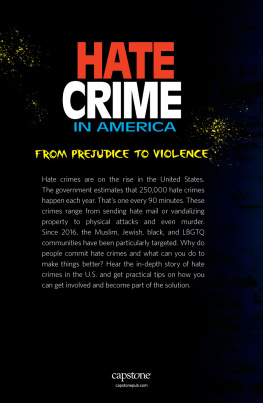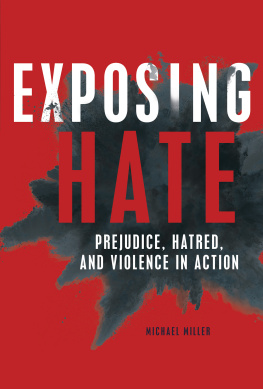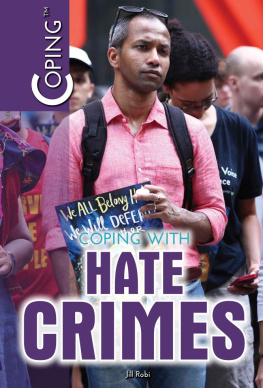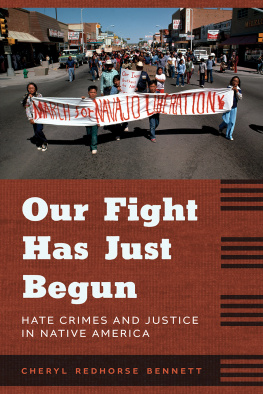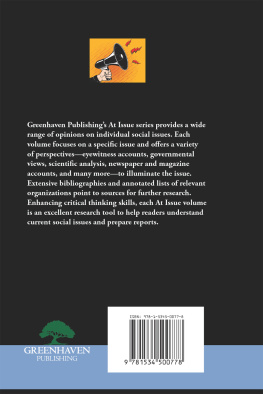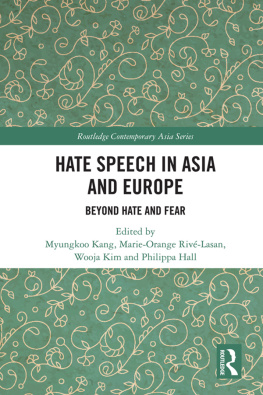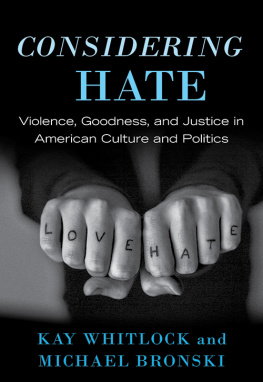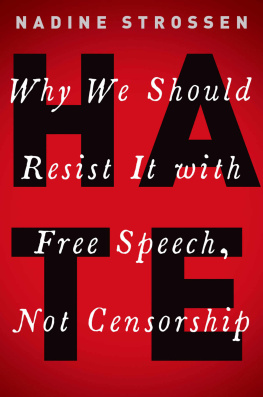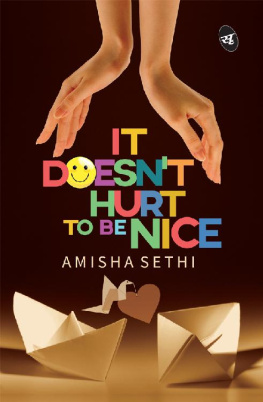Table of Contents
Guide


2018 by Arjun Singh Sethi
All rights reserved.
No part of this book may be reproduced, in any form, without written permission from the publisher.
Requests for permission to reproduce selections from this book should be mailed to: Permissions Department, The New Press, 120 Wall Street, 31st floor, New York, NY 10005.
Published in the United States by The New Press, New York, 2018
Distributed by Two Rivers Distribution
ISBN 978-1-62097-372-1 (e-book)
LIBRARY OF CONGRESS CATALOGING-IN-PUBLICATION DATA
Names: Sethi, Arjun Singh, editor.
Title: American hate: survivors speak out / edited by Arjun Singh Sethi.
Description: New York: New Press, [2018] | Includes bibliographical references.
Identifiers: LCCN 2018017581
Subjects: LCSH: Victims of hate crimeUnited States. | Hate crimesUnited States. | RacismUnited StatesHistory21st century. | United StatesRace relationsHistory21st century. | United StatesPolitics and government2017
Classification: LCC HV6773.52 .A44 2018 | DDC 362.88dc23 LC record available at https://lccn.loc.gov/2018017581
The New Press publishes books that promote and enrich public discussion and understanding of the issues vital to our democracy and to a more equitable world. These books are made possible by the enthusiasm of our readers; the support of a committed group of donors, large and small; the collaboration of our many partners in the independent media and the not-for-profit sector; booksellers, who often handsell New Press books; librarians; and above all by our authors.
www.thenewpress.com
Book design and composition by Bookbright Media
This book was set in Sabon and Nosta
10 9 8 7 6 5 4 3 2 1
To the silenced and unheard,
to my mother, who is strong and compassionate,
in gratitude and promise
CONTENTS

THIS IS A BOOK ABOUT PEOPLE WHOSE LIVES HAVE BEEN impacted by hate. It is a book about communities under threat. It is a book about pain, struggle, and resilience.
Hate comes in many forms: vicious intimidation and cybertrolling; vandalism and arson of houses of worship; and assault or even murder on your own doorstep. It also comes in the form of government regulations and policies: banishing immigrants and separating them from their families because they do not have papers; depriving the elderly, poor, communities of color, and people with disabilities of health care; appropriating Native lands and resources; and threatening to send refugees home where they would face an uncertain future. People are targeted across this country because of their race, national origin, sex, gender identity, sexual orientation, faith, disability, immigration status, and other personal characteristics.
We must begin by acknowledging that this country was built on a hate crime. The Native people of this land were displaced and exterminated to make room for Christians and Europeans. Hate has been a fixture of our country for as long as it has existed. Land theft, slavery, segregation, xenophobia, and exclusion are defining features of our history. So is the ideology of white supremacy, the belief that the white race is superior to all others. It is why we segregated black people from white people after slavery and allowed Jim Crow laws to flourish; allowed mobs and vigilantes to roam freely and lynch black people at will; banned the Chinese from immigrating in 1882; and incarcerated more than 100,000 Japanese Americans during World War II.
We have also seen that hate violence can strike at any time and is often used to keep vulnerable communities in their place. In 1907, a rabble of five hundred white men assaulted more than one hundred South Asian workers in Bellingham, Washington, locked them in the basement of city hall, and then forced them out of town. In 1963, known Ku Klux Klansmen bombed the 16th Street Baptist Church in Birmingham, Alabama, killing four girls and injuring others. In 1998, two men tortured and murdered Matthew Shepard in Laramie, Wyoming, because he was gay. And in 2015, an avowed white supremacist, Dylann Roof, murdered nine people at the Emanuel African Methodist Episcopal Church in Charleston, South Carolina. Hate and discrimination are not new; they are part of our countrys DNA. Throughout it all, targeted communities have learned a painful lesson. The promises of equality under the law and freedom from harm are often the most enduring and dangerous illusions of American life.
In this book, you will find stories about hate and its terrible consequences in America. And while it is a fact that communities of color, immigrants, people of faith, and others have long faced hate in this nation, something has changed during these past few years. I have spoken and met with organizers, activists, and policy advocates; and sat down with survivors of hate in their offices, universities, community centers, houses of worship, and homes. They all say something similar. The 2016 presidential campaign and subsequent election of Donald J. Trump emboldened, empowered, enabled, facilitated, and legitimized the very worst in America: racism, xenophobia, Islamophobia, sexism, anti-Semitism, homophobia, transphobia, ableism, and anti-immigrant hostility. Much of what we see today is an outgrowth of what we have experienced before, but the hate nowadays is more visceral and widespread than many of us could have imagined just a few years ago.
There are many who ask why President Trump does not condemn acts of hate and bigotry, and when he does, why it takes him so long. But Trump told us who he was a long time ago, and it is time we believed him. He is a racist and a sexist, and his ideologies are white supremacy and greed. He is the hater-in-chief, and his history, rhetoric, and policies show it.
Trump was twice accused of discriminating against African American renters in New York City. He bought full-page newspaper ads calling for the execution of the Central Park Five, five young men of color who were arrested for attacking a jogger, and he continued to proclaim their guilt even after they were exonerated. As a casino owner, he ordered black employees off his casino floors during his visits and called them lazy. He secretly funded anti-Native ads featuring pictures of cocaine and syringes, and insulted a group of Natives during a Congressional hearing, saying, They dont look like Indians to me. He was a leading proponent of birtherism, a movement to delegitimize former president Barack Obama.
Trumps presidential campaign was an extension of this ugly and virulent worldview. He called Mexican undocumented immigrants rapists; ridiculed Chinese and Japanese trade negotiators using broken English; defended two white men who assaulted a Latino man as passionate supporters; criticized a judge because he was Mexican; approved the beating of a Black Lives Matter protester; mocked a reporter with a disability; stereotyped Jews as cunning negotiators; declared that Islam hates us; and repeatedly called an elected official of Native heritage Pocahontas.
Trump stirred racial divides and fanned white anxiety throughout his campaign. White nationalist, neo-Nazi, racist skinhead, and anti-Muslim groups were already on the rise, and Trump courted them with his speeches, retweets, and deafening silence. Some of these organizations are new and were created after the election of President Obama, while others, like the Ku Klux Klan, date back more than one hundred years. They vary in size, structure, and resources, but their members share a common belief that they are superior to others. Trump spoke of a disappearing history and culture, and nativists felt vindicated. Their white privilege was renewed, and they celebrated Make America Great Again with thunderous applause. Trump said he wanted to restore the waning demographic and economic power of the hinterland, and when he blamed immigration and trade, rather than corporate excess and technological disruption, many believed him and ignored his racism. He openly ridiculed and insulted women, and some men felt restored. He rarely mentioned the words white, straight, Christian, or men, but it was clear to whom he was appealing.
Next page

